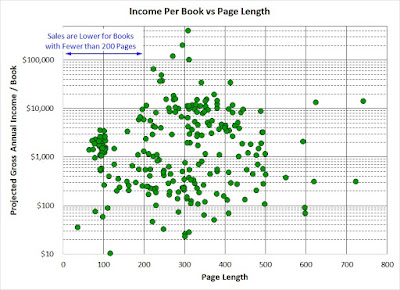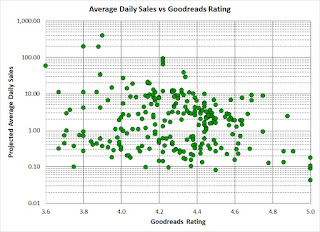One of the questions that many indie authors have is what value social media engagement might hold for marketing their writing. There are a lot of opinions on this subject, and there will always be the case of "so-and-so who became famous because of social media." There will always be some anecdotal tale used as justification for sinking energy into blogs, tweets or other social networking activities. But is this really a strategy that beginning authors should rely upon? Especially authors of fiction? Is there any real evidence that social media makes a difference for most beginning authors - or would they be better off spending their hours on writing rather than posting on Twitter, Facebook or some other site?
At my middle daughter's suggestion, we conducted an investigation to quantify the relationship between social media engagement and book sales for a sample of 124 "new" fiction authors. The authors sampled each had only one novel currently available in their respective fiction genre. Most of the books were Fantasy titles, although a few could have been classified as Science Fiction. A snapshot of each title's Amazon ranking was taken on 26 Nov 2020, and the Amazon ranking was converted into an estimate for each book's daily or annual sales using online tools and resources as described in a previous post.[1][2]
The first comparison which was drawn was an assessment for each book's projected eBook sales versus their price. Previously, for more established indie authors, it had been found that there was a "sweet spot" for balancing sales versus cover price.[3] For these new indie authors, however, that "sweet spot" was not obvious. What was obvious was that authors promoting free books sold considerably more copies than any of the others. To help ensure that the subsequent comparisons were not accidentally skewed, the two titles being promoted as free were omitted from the comparisons which follow.
Comparisons were drawn, exploring possible correlations between sales and social media "likes" on Facebook, Twitter, Instagram, and YouTube, as well as any activity on the author's personal website or blog. Social media "likes" or other activity were tallied for the thirty days preceding the snapshot from 26 Nov.
Out of the 122 new authors, 25 had no Facebook page, and another 46 had a Facebook page but had not posted during the prior thirty days. The remainder had all posted and received "likes" or other interactions during the prior thirty day period. A couple of relationships become evident from this comparison. On the one hand, on average, those authors who were active on Facebook saw 56% more sales than those authors who did not have a Facebook account. Among those authors who were active on Facebook, however, there was virtually no difference in sales between those who posted frequent content and collected many "likes" and those who only posted once or twice in the prior thirty days. The trendline for adding posts and accumulating "likes" was flat.
A similar trend could be observed for Twitter accounts. Of the 122 new authors, 31 had no Twitter account, and another 31 had a Twitter account but had not posted or received "likes" during the prior thirty day period. The remaining authors had at least some degree off activity on Twitter. On average, those authors who were active on Twitter saw 38% more sales than those who were not active. Once again, however, there was no relationship between having more posts and likes on Twitter and accumulating more book sales.
In contrast, there was a trend between accumulating additional "likes" and typical sales activity for those authors active on Instagram. Of the 122 new authors, 42 had no Instagram account, and another 16 had an Instagram account but were inactive during the preceding thirty days. The remaining authors all had some degree of activity on Instagram. From the projected trendline, an author with 10,000 likes during the preceding thirty day period could expect to see nearly three times as many sales as an author who received only 10 likes during this same period. There is therefore evidence for a trend - although the amount of effort needed to go from 10 to 10,000 likes was no doubt significant.
There was also a trend which could be observed from authors with active YouTube accounts, although the sample size for active accounts was smaller. Of the 122 new authors, 94 had no author's YouTube account, 21 had an account but had not been active during the previous thirty days, and only 7 were active during the thirty day period. Of those who were active, there was a correlation between greater social media engagement and increased book sales - but only for those authors at the extreme end of active engagement. More interesting was that on a median basis, those authors who had a YouTube account but were inactive saw 88% more sales than those authors without a YouTube account. Those with minimal YouTube engagement (less than 100 likes in the past thirty days) saw fewer sales on average than those with inactive YouTube accounts, and only those with very active YouTube accounts (more than 1000 likes over the past thirty days) saw an additional increase in their sales beyond this baseline effect.
Finally, a comparison was drawn to assess any correlation between authors with personal landing sites or blogs and those without. Of the 122 new authors sampled, 23 had no author's site or blog, 84 had an author's site but had not posted or blogged within the past thirty days. Of the remaining authors, those with an active blog or author page, there was no favorable correlation between those who posted more frequently and those who posted less. If anything, there was a negative correlation, where the authors who posted the most saw fewer sales than those who posted less frequently. This was probably a product of the small sample size available. Significantly, however, those authors with a website or blog saw 50% more sales, on average, than those without one.
Taken as a whole, the following trends should be evident:
- Maintaining a minimal social media presence in the form of a website, and accounts on Facebook, Twitter, Instagram and YouTube has a positive correlation with book sales. If I had to speculate, I would suggest that authors benefit from having a broader footprint which makes it easier for prospective buyers to find them and their books.
- Adding more frequent posts to either Facebook or Twitter carried no appreciable correlation with additional sales.
- Adding more frequent posts on YouTube did appear to carry a correlation with additional sales, but only if significant engagement was achieved.
- Unlike Facebook or Twitter, adding additional posts on Instagram did show a correlation with higher sales - although the amount of effort and engagement needed to achieve 1,000 or more likes over a thirty day period should be weighed against other activities which might also benefit the author and their book sales.
In short, most new authors of fiction would benefit from having a social media footprint which will make their writing easier to find. Additional activity, beyond a post or update once per month, however, appears to carry minimal advantage.
The best advice for new fiction authors was probably summed up in a prior post under this blog: write more books. On average, adding a second book to an author's portfolio will increase total sales by a factor of three. Adding a third book will increase total sales by a factor of more than five.[1] Social media should not be completely neglected, but it is nowhere near becoming the most powerful tool at a writer's disposal. Writing is.
References:
[1] Golan, J.W. "Indie Author Snapshot: The Impact of Adding More Books to an Author's Portfolio." J.W. Golan: An Author's Blog, 8 June 2020. https://jwgolan.blogspot.com/2020/06/indie-author-snapshot-impact-of-adding.html.
[2] Chesson, Dave. "Amazon Sales Rank Calculator." KindlePreneur, 9 Mar 2020. https://kindlepreneur.com/amazon-kdp-sales-rank-calculator/.
[3] Golan, J.W. "Indie Author SnapShot: A Sweet Spot for eBook Pricing." J.W. Golan: An Author's Blog, 8 July 2020. https://jwgolan.blogspot.com/2020/07/indie-author-snapshot-sweet-spot-for.html.











































